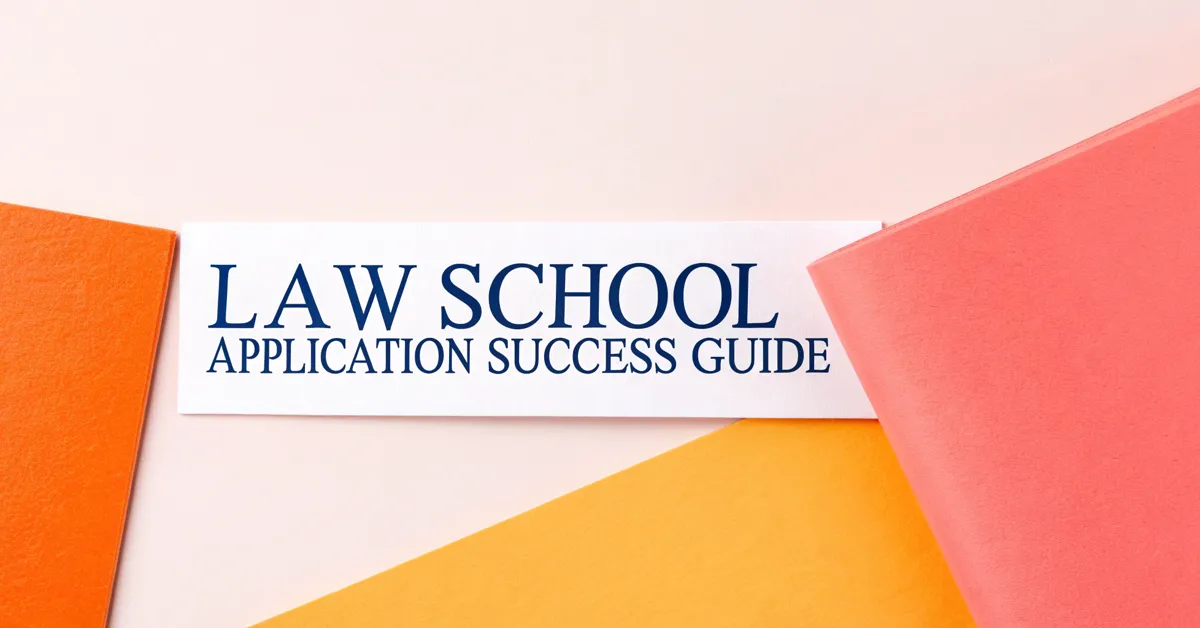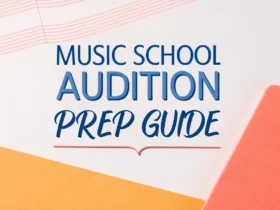Applying to law school can feel like scaling Everest—daunting, challenging, and requiring meticulous preparation. The good news is that with the right guidance, you can navigate the process with confidence and increase your chances of acceptance. Many view the journey with stress, each year thousands of prospective students worry over test scores, personal essays, and letters of recommendation. But, the law school application process also can be full of hope and purpose.
In this comprehensive guide, you’ll get insights and actionable strategies to make your application shine. You’ll learn how to choose the right schools, craft a compelling personal statement, ace the LSAT, and secure those all-important letters of recommendation. We will give you a clearer path toward achieving your dream of attending law school.
Law School Application: Start Early and Strategize Well
Success in law school admissions begins long before you even think about filling out an application. Smart planning can help you get ahead. Here’s how to lay a strong foundation:
Academic Excellence Matters
Your undergraduate GPA is a key part of your application. It shows your ability to handle college level courses. Most law schools look for students with a history of academic success.
- Focus on challenging courses: Push yourself with rigorous classes. This shows you’re ready for the demands of law school.
- Aim for high grades: Grades matter. Strive for the best GPA you can achieve. Every point can improve your chances.
LSAT: The Key to Unlocking Doors
The Law School Admission Test (LSAT) is another crucial component of your application. The LSAT is a tough exam. Top law schools want high scores.
- Start early: Begin prepping months in advance. A solid study schedule is key.
- Use official materials: Use practice tests from the Law School Admission Council (LSAC). They mimic the real test.
- Consider a prep course: Prep courses can provide structure and expert tips. Assess your needs and budget.
Choose the Right Law Schools
Selecting the right law schools is a strategic move. Align your goals with the strengths of each school.
- Research school rankings: Rankings can be a starting point. U.S. News & World Report is a common source.
- Consider location: Think about where you want to live and work after graduation. Law schools often have strong regional networks.
- Review programs and specialties: Look at what each school offers. Do they specialize in your areas of interest?
- Look at job placements: Schools often have reports showing employment rates, so make sure the numbers and information are up to date.
Build Meaningful Experiences
Experiences beyond the classroom can help you stand out. They provide examples of your skills, passions, and commitment.
- Engage in extracurriculars: Join clubs and organizations that align with your interests. Take on leadership roles if you can.
- Volunteer: Helping others shows character. Pick causes that resonate with you.
- Seek internships: Internships give real world exposure. Legal internships are a plus.
Plan and Stay Organized
Good planning can ease stress. Keep track of deadlines and requirements.
- Create a timeline: Map out key tasks. Set goals for each step.
- Use a checklist: Track your progress. Ensure you don’t miss anything.
- Stay ahead of deadlines: Avoid last minute rushes. Start applications early.
Starting early and planning well can make a big difference. It can set you apart from other applicants.
LSAT Mastery: Ace the Law School Admission Test
The LSAT is a key factor in law school admissions. A strong LSAT score can open doors. Here’s a guide to mastering the LSAT.
Understand the Test
Know what the LSAT tests. It checks your reading, logic, and reasoning skills.
- Sections: There are three scored sections: Reading Comprehension, Logic Games, and Logical Reasoning.
- Format: It’s now a digital test. Get familiar with the format.
- Scoring: Scores range from 120 to 180. Most schools publish their median LSAT scores.
Effective Study Strategies
Smart studying is the key to a good score. Tailor your plan to your strengths and weaknesses.
- Diagnostic Test: Start with a diagnostic test. It shows what you need to work on.
- Set a Schedule: Make a study plan. Be consistent. Stick to it.
- Review: Go over previous tests, so you know what to expect.
Practice, Practice, Practice
Practice exams are a must. They help you get used to the LSAT.
- Use official materials: The LSAC offers official practice tests. These are the most like the real test.
- Simulate Test Conditions: Take practice tests under timed conditions. Mimic the test day experience.
- Review Your Answers: Review each question. Understand why you got it right or wrong.
Tips for Each Section
Each LSAT section tests different skills. Adjust your prep for each section.
- Reading Comprehension: Improve your reading speed. Practice summarizing passages.
- Logic Games: Master diagramming techniques. Do lots of games to improve speed.
- Logical Reasoning: Learn to spot flaws in arguments. Practice identifying assumptions.
Time Management
Pacing is key on the LSAT. Learn to manage your time.
- Practice with a timer: Get used to the time limits. Learn to move on when needed.
- Don’t linger: If a question stumps you, skip it. Come back later if you have time.
Test-Taking Mindset
Your mindset matters on test day. Stay calm. Stay focused.
- Get Enough Sleep: Rest up the night before the test.
- Eat Well: Have a good meal before you test.
- Stay Calm: Manage your stress. Take deep breaths.
Beyond the LSAT
While the LSAT is key, it’s just one part of your application. Grades, essays, and recommendations also matter.
- Holistic Review: Law schools look at the whole picture. Focus on all parts of your application.
- Balance Your Efforts: Don’t let the LSAT overshadow other areas.
Mastering the LSAT takes effort. With the right prep, you can achieve your best score. This can greatly improve your chances of getting into law school.
Crafting a Compelling Personal Statement
The personal statement is a key part of your law school application. It lets you show your story, passion, and goals. It shows who you are beyond scores and grades. Here’s how to write a statement that grabs attention.
Understand the Purpose
Know what the personal statement is for. It shows who you are and why you want to study law.
- Show, Don’t Tell: Use stories and examples. Don’t just list your good points.
- Connect to Law: Link your experiences to your interest in law. Show why law is the right path.
- Highlight Strengths: Focus on what makes you unique. Show your best traits.
Choose a Topic Wisely
Pick a topic that shows who you are. Be unique and relevant.
- Reflect: Think about your life. What moments changed you?
- Be Authentic: Write about something you care about. Don’t fake it.
- Think Unique: What can you share that others can’t?
Structure Your Essay
Good structure makes your essay easy to read. It also helps your ideas shine.
- Introduction: Grab the reader’s attention. State your main idea.
- Body: Tell your story. Use examples. Show how you grew.
- Conclusion: Sum up your points. Reiterate your interest in law.
Show Personality
Let your voice come through. Be yourself.
- Be Genuine: Write like you talk. Don’t try to sound too formal.
- Use Your Style: Show your unique way of seeing the world.
- Be Real: Share your dreams and fears. Be human.
Revise and Refine
Good writing takes time. Revise your essay. Make it better.
- Edit: Check for errors. Make sure your writing is clear.
- Get Feedback: Ask others to read your essay. Get their thoughts.
- Revise: Change your essay based on feedback. Make it shine.
Common Pitfalls
Avoid common mistakes. Make sure your essay stands out for the right reasons.
- Clichés: Avoid overused phrases. Be original.
- Generic Statements: Be specific. Don’t just say “I want to help people.”
- Negativity: Stay positive. Focus on your strengths.
Make it Memorable
Your essay should stick in the reader’s mind.
- Start Strong: A great first line hooks the reader.
- End Well: Leave the reader with a lasting impression.
- Be Unique: Make them remember you.
Crafting a great personal statement takes work. With the right approach, you can create an essay that shows who you are. This can improve your chances of getting into law school.
Letters of Recommendation: Securing Strong Endorsements
Recommendations matter in the law school application process. Strong letters can help you stand out. They give real world proof of your skills and traits. Here’s how to secure great recommendations.
Choose Recommenders Wisely
Pick people who know you well. They should speak to your abilities and character.
- Professors: They know your academic work. Pick those you excelled with.
- Supervisors: They can speak to your work ethic and skills.
- Mentors: They can talk about your growth and potential.
Give Recommenders Time
Ask early. Give your recommenders time to write good letters.
- Ask Months in Advance: Don’t wait until the last minute.
- Respect Deadlines: Make sure they know when letters are due.
Provide Helpful Information
Help your recommenders write good letters. Give them what they need.
- Resume: Provide your resume. It outlines your experiences.
- Transcript: Give them your academic transcript.
- Personal Statement Draft: Share your personal statement. They can tie it to their letter.
- Specific Accomplishments: Remind them of key projects and successes.
Communicate Your Goals
Make sure your recommenders know your plans.
- Discuss Why You Want to Study Law: Share your passion.
- Explain Which Law Schools You’re Applying To: This helps them tailor their letter.
Follow Up Politely
Stay in touch. Remind them gently as deadlines approach.
- Send a Reminder: A friendly email is fine.
- Thank Them: Always show your appreciation.
Content of Strong Letters
Know what makes a good letter. Aim for letters that are specific and supportive.
- Personal Anecdotes: Stories make the letter more engaging.
- Specific Examples: Show how you excel. Don’t just say you’re “hardworking.”
- Highlight Key Skills: Focus on traits that matter for law school.
Waive Your Right to Access
Waiving your right to see the letters adds credibility. It shows trust in your recommenders.
- LSAC Process: Follow the LSAC instructions for waiving access.
- Explain to Recommenders: Let them know why this is important.
Thank You Notes
Always thank your recommenders. Show your gratitude.
- Write a Thank You Note: A handwritten note is a nice touch.
- Keep Them Updated: Let them know where you get in.
Getting strong recommendations takes effort. With the right approach, you can secure letters that make your application stand out. This can boost your chances of law school acceptance.
Addressing Weaknesses in Your Application
Every applicant has weaknesses. It’s how you deal with them that counts. Address them head on. Show how you’ve grown. Here’s how to handle application flaws.
Identify Your Weaknesses
Be honest with yourself. Know where you fall short.
- Low GPA: Did you struggle in undergrad?
- Low LSAT: Did you score below target?
- Lack of Experience: Do you have limited legal or related work?
- Gaps in Education: Are there breaks in your academic record?
- Character & Fitness: Are there past issues?
Be Honest and Transparent
Don’t hide your weaknesses. Address them directly.
- Acknowledge the Issue: Don’t make excuses.
- Take Responsibility: Show you understand the impact.
Explain the Circumstances
Provide context. Help the admissions committee understand.
- Briefly Describe the Situation: What happened?
- Avoid Blame: Don’t point fingers.
- Focus on Facts: Keep it factual.
Highlight Growth and Improvement
Show how you’ve learned. Highlight positive changes.
- What Did You Learn?: How did the experience change you?
- How Did You Grow?: What steps did you take to improve?
- Demonstrate Resilience: Show you can bounce back.
Use Addenda Wisely
Addenda are extra essays. Use them to explain weaknesses.
- Keep it Concise: Be brief and to the point.
- Focus on Key Information: What does the committee need to know?
- Don’t Over-Share: Avoid unnecessary details.
Strengthen Other Areas
Boost the parts of your application that are strong.
- Excellent Essays: Make your personal statement shine.
- Strong Recommendations: Get letters that highlight your best traits.
- Impressive Experiences: Showcase your skills and achievements.
Show Potential
Focus on your future. Show what you can achieve in law school.
- Highlight Your Goals: What do you want to do with a law degree?
- Demonstrate Passion: Show your enthusiasm for law.
- Express Commitment: Show you’re ready for the challenge.
Get Feedback
Ask others to review your addenda.
- Trusted Advisors: Professors, mentors, and friends can help.
- Law School Admissions Consultants: Experts can provide advice.
Maintain a Positive Tone
Stay positive. Show optimism and determination.
- Avoid Self-Pity: Focus on growth and future success.
- Express Gratitude: Thank the committee for considering you.
Dealing with weaknesses is part of the application process. By being honest, showing growth, and highlighting your strengths, you can increase your chances of admission.
Law School Admissions: Finalize and Submit Your Application
Getting to the end of the application process can bring great feelings. Make sure every detail is right. This can mean all the difference in your journey to law school.
Review Every Detail
Go over your application closely. Correct mistakes and fill any holes.
- Check for Errors: Look for typos and grammar errors.
- Ensure Accuracy: Make sure all info is correct.
- Confirm Completeness: Did you fill out every section?
Double-Check Requirements
Verify that you’ve met all requirements. Make sure you haven’t skipped anything.
- LSAC Instructions: Follow the LSAC guidelines.
- School-Specific Rules: Each law school may have its own rules.
- Deadlines: Check all deadlines to know when the information is due.
Perfect Your Essays
Make your essays as good as they can be.
- Clarity: Is your writing clear and easy to understand?
- Conciseness: Have you cut out unnecessary words?
- Impact: Does your essay make a strong impression?
Solicit Final Feedback
Ask others to review your application. A fresh look can catch mistakes you missed.
- Trusted Advisors: Ask mentors, professors, and friends.
- Law School Admissions Consultants: Experts can provide insights.
Organize Your Documents
Keep all your documents organized. This can save stress and time.
- Digital Copies: Keep digital copies of everything.
- File Names: Use clear file names.
- Backups: Back up your files in case of trouble.
Hit Submit
Once you’re sure everything is right, submit your application.
- Do Not Wait Until the Last Minute: Submit early to avoid problems.
- Confirm Submission: Check that your application has been sent.
Relax and Breathe
After submitting, try to relax. The hard work is done.
- Distract Yourself: Focus on other activities.
- Stay Positive: Believe in your chances.
Track Your Status
Monitor your application status. Know when to expect updates.
- LSAC Account: Check your LSAC account for status changes.
- School Portals: Law schools may have their own portals.
- Email: Watch for emails from law schools.
Prepare for Interviews
Some law schools may interview applicants. Get ready to impress.
- Research the School: Know about their programs and values.
- Practice Common Questions: Prepare answers for common questions.
- Dress Professionally: Make a good impression.
Consider a Waitlist Strategy
If waitlisted, don’t give up. Take steps to improve your chances.
- Express Interest: Reaffirm your commitment to the school.
- Provide Updates: Share new achievements or information.
- Write a Letter of Continued Interest: Send a letter explaining why you’re a good fit.
Finalizing and submitting your application is a big step. By paying attention to details, seeking feedback, and staying organized, you can increase your chances of admission.
The Waiting Game: What to Do After You Apply
You’ve hit “submit.” Now what? The period after you apply to law school can be stressful. Here’s how to handle the waiting game.
Manage Your Expectations
Understand the timeline. It can take months to hear back.
- Application Volume: Law schools get thousands of applications.
- Review Process: Each application gets careful review.
- Notification Dates: Know when schools plan to notify applicants.
Stay Busy and Productive
Don’t put your life on hold. Stay engaged and productive.
- Work or Intern: Gain more experience.
- Volunteer: Make a difference in your community.
- Take Classes: Boost your skills.
Monitor Your Email
Check your email regularly. Law schools often communicate by email.
- Spam Folder: Check your spam folder too.
- Respond Promptly: Answer emails quickly.
Update Your Application
If you have new information, update the schools.
- New Grades: Share improved grades.
- New Achievements: Share new accomplishments.
- Letters of Continued Interest: Send to schools if waitlisted.
Plan for Multiple Outcomes
Be ready for different results.
- Acceptances: Celebrate your successes.
- Rejections: Don’t get discouraged.
- Waitlists: Prepare a strategy for waitlists.
Research Financial Aid
Start planning for how you’ll pay for law school.
- Scholarships: Look for scholarship opportunities.
- Loans: Understand loan options.
- Financial Aid Forms: Fill out required forms.
Visit Admitted Student Events
If accepted, attend admitted student events.
- Meet Faculty: Connect with professors.
- Meet Students: Network with future classmates.
- Get Information: Learn more about the school.
Make Your Decision
Once you have offers, weigh your options.
- Visit Schools: See if you can visit your top choices.
- Consider Fit: Think about which school is the best fit for you.
- Evaluate Finances: Consider the cost of each school.
Decline Other Offers
Once you’ve made a choice, decline other offers.
- Notify Schools: Let them know you won’t be attending.
- Be Courteous: Thank them for their consideration.
Prepare for Law School
Get ready for your first year.
- Read Recommended Books: Familiarize yourself with legal concepts.
- Connect with Current Students: Get advice and insights.
- Attend Orientation: Learn about resources and expectations.
The waiting game can be tough. By staying busy, monitoring your status, and planning for different results, you can navigate this period with confidence.
Is Law School Worth It? Weighing the Pros and Cons
Deciding to go to law school is a big call. Think about the good and bad sides. This can help you choose the right path. Here’s a look at what to think about.
The Upsides of Law School
Going to law school can lead to great personal and professional success.
- Career Options: A law degree opens many doors. You can be a lawyer, judge, professor, or consultant.
- Earning Potential: Lawyers often make good money.
- Intellectual Challenge: Law study is tough and thought-provoking.
- Making a Difference: You can help people and shape society.
- Prestige: Being a lawyer carries respect.
The Downsides of Law School
Law school also has challenges. Be aware of them before you commit.
- High Cost: Law school is expensive.
- Debt: Many students take out big loans.
- Competitive Job Market: Getting a job after law school can be hard.
- Stress: Law school can be very stressful.
- Long Hours: Lawyers often work long hours.
- Emotional Toll: Legal work can be emotionally taxing.
Consider Your Goals
Think about what you want in life.
- Career Aspirations: What kind of job do you want? Does it need a law degree?
- Financial Situation: Can you afford law school?
- Personal Values: Do you value intellectual work and helping others?
- Lifestyle Preferences: Are you okay with long hours and stress?
Talk to Lawyers
Ask lawyers about their experiences. Learn what it’s really like.
- Shadow a Lawyer: See a lawyer in action.
- Interview Lawyers: Ask about their day-to-day work.
- Get Advice: Seek tips and insights.
Think About Alternatives
Are there other ways to reach your goals?
- Paralegal: Assist lawyers without a law degree.
- Legal Studies: Study law without going to law school.
- Policy Work: Work in government or nonprofits.
Evaluate the Job Market
Learn about job trends for lawyers.
- Employment Rates: What percentage of graduates get jobs?
- Salary Data: How much do lawyers earn?
- Job Growth: Are there enough jobs for new lawyers?
Assess Your Strengths
Are you a good fit for law school?
- Analytical Skills: Can you think logically?
- Reading Comprehension: Can you understand complex texts?
- Writing Skills: Can you write clearly and persuasively?
- Communication Skills: Can you speak well?
- Resilience: Can you handle stress and setbacks?
Research Law Schools
If you decide to apply, research schools carefully.
- Rankings: Where does the school rank?
- Programs: What programs does it offer?
- Location: Where is it located?
- Cost: How much does it cost?
- Culture: What’s the school culture like?
Deciding if law school is right for you takes thought. Weigh the pros and cons. Consider your goals and skills. Talking to lawyers and researching alternatives can help. If you choose law, pick the right school. Then, work hard to make the most of your education.
The journey to law school is filled with hope, dedication, and the promise of a fulfilling legal career. By mastering the LSAT, crafting a personal statement that resonates, and securing impactful recommendations, you pave the way for success. So, embrace the challenge, prepare meticulously, and approach each step with unwavering dedication, and you’ll get the most out of your law school application.















Leave a Reply
View Comments